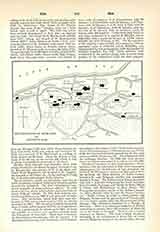

Goar, SAINT, an anchorite of Aquitaine; b. about 585; d. near Oberwesel (Germany), 6 July, 649. He came of a distinguished family, and at an early age gave evidence of sound piety. Prayer was the constant occupation of his heart, and meditation on the truths of religion that of his mind. Having received Holy orders, and being thus enabled to act with more authority, he laboured to secure the salvation of a great number of souls. But being above all solicitous for his own sanctification, he resolved to leave the world, and about 618 he took up his dwelling in a lonely place at the extremity of the Diocese of Trier and in the neighbourhood of the little town of Oberwesel. It was here that, near a little chapel which he built, he began to lead an existence completely detached from material and perishable things. Nevertheless it was impossible for him so to conceal himself that his reputation did not spread far and wide. Pilgrims flocked to him, thus furnishing him with occasions to exercise the duties of hospitality in their behalf and to give them good advice. Two of them denounced him to Rusticus, Bishop of Trier, as a hypocrite and fond of good living, and he was called upon by the bishop to defend himself. According to the legend, he did so with the help of a miracle which resulted in the bishop’s confusion and in the manifestation of his unworthiness. King Sigebert III having learned of the occurrence summoned St. Goar to Metz and insisted that he should accept the episcopal see from which Rusticus had been driven. But the pious hermit was frightened by this offer, and asked time for reflection. On returning to his solitude he fell sick, and died before the burden of the episcopal dignity had been imposed upon him. A small church was dedicated to him, in 1768, in the little town on the banks of the Rhine which bears his name (St-Goar).
MABILLON, Acta SS. ord. S. Bened. (1669), II, 276-280; Hist. litt. de la France (1735), III, 501-502; BAILLET, Vies des saints (1701), III, 6 July.
LEON CLUGNET

